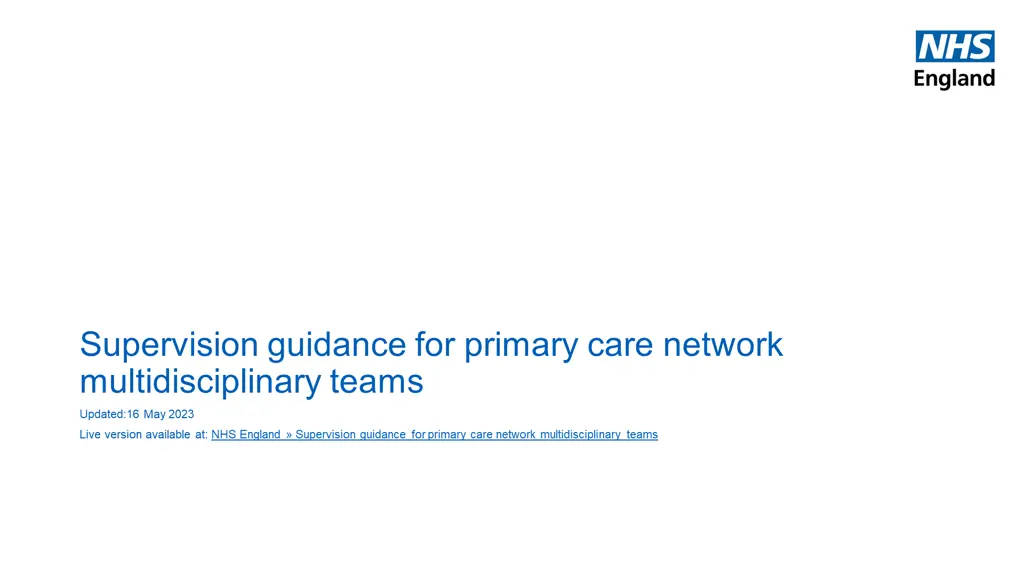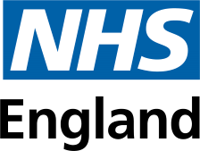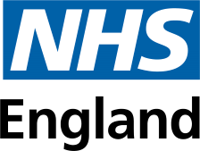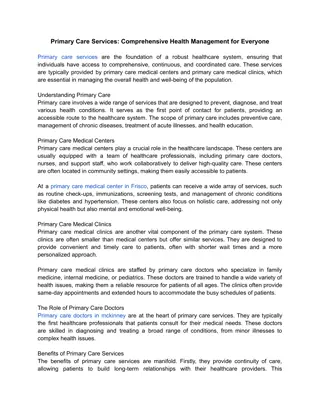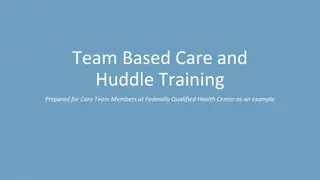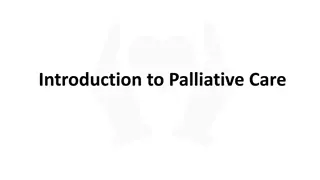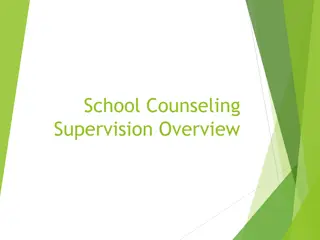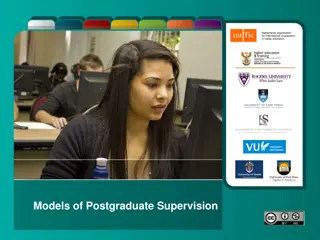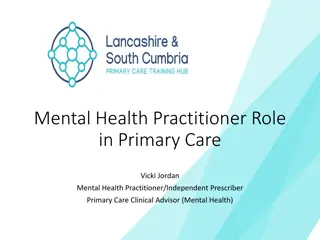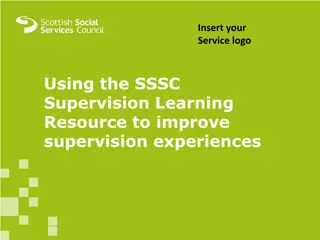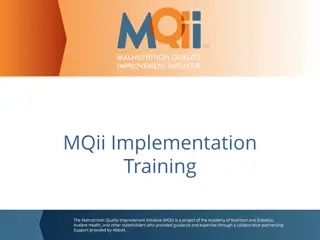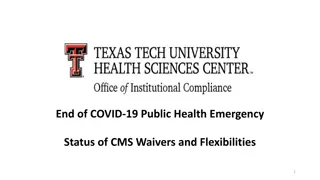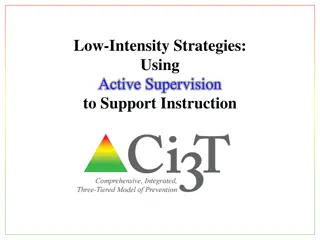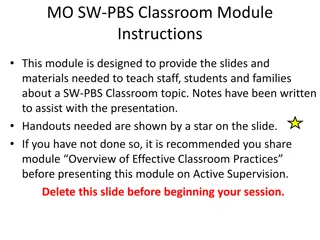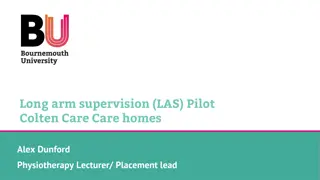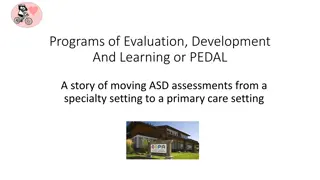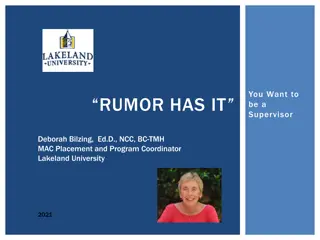Supervision Guidance for Primary Care Network Multidisciplinary Teams
Guidance supports primary care networks and GP practices in providing effective supervision for their growing multidisciplinary teams. It sets out principles of supervision, identifies best practices for clinical governance, and provides guidance on workforce training and development.
Download Presentation

Please find below an Image/Link to download the presentation.
The content on the website is provided AS IS for your information and personal use only. It may not be sold, licensed, or shared on other websites without obtaining consent from the author. Download presentation by click this link. If you encounter any issues during the download, it is possible that the publisher has removed the file from their server.
E N D
Presentation Transcript
Supervision guidance for primary care network multidisciplinary teams Updated:16 May 2023 Live version available at: NHS England Supervision guidance for primary care network multidisciplinary teams
Purpose This guidance supports primary care networks (PCNs) and GP practices to provide effective supervision for their growing multidisciplinary teams (MDTs). It: sets out principles of supervision for roles new to general practice identifies best practice to support the development of good clinical governance provides guidance on training and developing the workforce. The guidance is intended to be a supporting resource; it should not be considered as contractual guidance or be used as a lever for contractual enforcement. It should be read in conjunction with the Network Contract DES, which sets out the minimum supervision requirements for staff recruited through the Additional Roles Reimbursement Scheme (ARRS), and other relevant guidance from NHS England, regulatory bodies, royal colleges and professional bodies (see Resources). While the focus of the guidance is for staff hired by PCNs via ARRS, the principles outlined will be applicable to other members of general practice teams. 2 |
What is supervision? Supervision is a process of professional learning and development that enables individuals to reflect on and develop their knowledge, skills and competence, through regular support from another professional. Supervision can have different forms and functions and a number of terms are used to describe these. For this guidance we use the below terms and define them as follows: Clinic/practice supervision: day-to-day support provided by a named/duty senior/more experienced clinician for issues arising in the practice. Clinical/professional supervision: regular support from a named senior/experienced clinician/practitioner to promote high clinical standards and develop professional expertise. Educational supervision: supports learning and enables learners to achieve proficiency. 3 |
Why provide supervision? Supervision underpins good and safe patient care, enabling healthcare professionals to develop their knowledge, skills and abilities to practice safely and effectively. Supervision is also a regulatory requirement; the Care Quality Commission (CQC) expects primary care providers to assure the capability, scope of practice and competency of their staff. The benefits of effective supervision include: improved quality of patient care through professional practice and reflection, helping to develop insights, maintain and refine care standards and increase confidence continued patient safety, through ensuring that staff work within their scope of practice and competence improved productivity through continuous professional development (CPD), ensuring that skills and knowledge are up to date enhanced job satisfaction, staff retention and wellbeing through improved team relationships and support from colleagues; including improved retention through support of staff working in isolation reduced stress and anxiety through the sharing of skills, knowledge and resources in a supportive environment. 4 |
Regulatory requirements CQC: Requirements of providers The Health and Social Care Act 2008 (Regulated Activities) 2014 Regulations set out a provider s responsibilities. The CQC s guidance for providers on meeting the regulations explains that providers are responsible for the staff they employ . The meaning of employed in the regulations is wider than staff directly employed on an employment contract: it means anyone who works for the provider, under its ongoing direction and control. Providers need to be assured about the fitness of those persons. Recruitment by another party may provide some assurance, but the registered provider should not assume that this guarantees fitness to practice; they must assure themselves that staff working under their direction and control have had the appropriate recruitment checks, are adequately supervised and are operating within the limits of their competency. This does not necessarily mean the provider themselves must carry out or repeat all the processes. However, it does need to reasonably assure itself that they have been done. For example, where a member of the MDT is employed by a practice on behalf of the PCN and provides services to other GP practices within that PCN, it is essential that each practice is assured of that staff member s competence and the suitability of supervisory arrangements. This could be secured through a (hard copy or emailed) letter of confirmation, memorandum of understanding, service-level agreement or Schedule 5 of the Network Agreement. Such agreements should clarify the recruitment checks undertaken and responsibilities for day-to-day clinical supervision. The requirement for assurances around recruitment and supervision would also apply where the staff member is employed by another organisation, e.g. a mental health practitioner employed by a mental health trust. 5 |
CQC expectations When the CQC assesses providers, it will look for evidence that providers have systems in place to ensure that staff are: recruited appropriately operating within the limits of their capability, scope of practice and competency provided with appropriate information, support and supervision to enable them to carry out their role. Relevant guidance from the CQC GP mythbuster 106: Primary care first contact practitioners (FCPs) Guidance for providers on meeting the regulations 6 |
Clinical Negligence Scheme for General Practice (1/2) The Clinical Negligence Scheme for General Practice (CNSGP) is a state indemnity scheme for general practice in England, administered by NHS Resolution on behalf of the Secretary of State for Health and Social Care. The CNSGP provides cover for NHS general practice clinical negligence liabilities arising from incidents occurring on or after 1 April 2019 and offers a fully comprehensive indemnity for all claims within its scope. All providers of NHS primary medical services are covered under CNSGP, including out of hours providers. The scheme extends to all GPs and others working for general practice who carry out activities in connection with the delivery of primary medical services. In addition to NHS primary medical services, any other NHS services provided by general practice are also covered under CNSGP (namely, NHS activities carried out by or for a provider whose principal activity is to provide NHS primary medical services). These other NHS services are referred to in the CNSGP regulations that established the scheme as ancillary health services . This means general practices are covered for all their NHS services, including local authority commissioned public health services. Claims against GP practices or other organisations providing NHS primary medical services or ancillary health services are covered under the scheme. This includes claims in respect of liabilities that arise as a consequence of the acts or omissions of employees and others engaged to carry out activities connected to the provision of such services. 7 |
Clinical Negligence Scheme for General Practice (2/2) Staff must be employed or engaged by a primary medical services contract holder for indemnity under the CNSGP to apply. Where a primary medical services contract holder engages temporary staff, including third sector volunteers, to support service delivery of NHS services for general practice, we recommend GPs put in place a secondment agreement, honorary contract or volunteer agreement to reflect the arrangement. We also recommend making clear the basis for lines of supervisory support (roles/responsibilities) for staff involved in the delivery of NHS services by general practice. For more information, please refer to: The National Health Service (Clinical Negligence Scheme for General Practice) Regulations 2019 (legislation.gov.uk) Clinical Negligence Scheme for General Practice (CNSGP) NHS Resolution 8 |
Types of supervision: Clinic/practice supervision A named senior clinician provides day-to-day supervision for issues arising in the practice. Senior clinicians are typically operating at a more advanced level of practice than the member of staff being supervised, with appropriate qualifications in relevant areas of clinical practice. This supervision should be provided for all staff working in practice, though its frequency and intensity may change depending on the needs of the team working and of the patients presenting in practice that day. Includes: day-to-day access to a first point of contact for general advice and support support with patient-related concerns and safeguarding procedures debriefs focusing on patient and practitioner safety, providing the opportunity for clinical reasoning and decision-making. Models All staff should have access to an appropriate named individual in the practice who can provide general advice, support and the opportunity for a debrief, on a day-to-day basis. This clinic supervision can be provided in different ways. Example models are provided below, but practices may choose to provide this supervision in other ways that best meets their organisational arrangements. Under all models, provision should also be made for access to support on an ad-hoc basis: for example, where a member of staff needs immediate advice regarding a patient they are with. 9 |
Clinic/practice supervision Model 1 Model 2 Slots made available in the diaries of named senior or experienced clinicians A named senior/experienced clinician solely provides advice and support for a clinical session. The supervisors may or may not be of the same profession as the person being supervised and supervision could be provided by more than one clinician depending on the issue/needs of the individual staff member. This may be a GP or senior clinician whose skills, experience and training can be used to support the MDT. Supervisors could rotate, e.g. by providing one session of supervision each day. The duration of each slot can be flexed based on the needs of the practice team. This would suit: practices where the MDT is relatively new to primary care and relatively inexperienced This would suit: practices where the workforce is more senior/experienced in their role and therefore may require less daily support practices that have a large and varied MDT and/or are training practices and provide a broader supervisory role. practices that cannot block out long slots of time in clinical days. This supervision can be supplemented with, but not replaced by, access to specialist advice and support from a colleague working in the same area of practice. This can be provided by the practice, PCN, employer or other agreed setting, e.g. secondary care. Some additional roles have specific requirements for clinic/practice supervision; for example, staff completing a roadmap to practice are required to have a daily debrief to ensure patient and practitioner safety. 10 |
Types of supervision: Clinical/professional supervision Regular support is provided by a named senior/experienced clinician/practitioner to promote high clinical standards and develop professional expertise. This may consist of a supervision package with different elements provided by different supervisors. For example, specific clinical skills may be overseen by one supervisor and overall professional oversight provided by another. Clinical/professional supervision should be provided for all staff. Practices/employers do not have to individually provide all elements of clinical/professional supervision as long as they are assured that staff working under their direction and control are receiving appropriate supervision and operating within the limits of their competency. The frequency and content of this supervision will vary depending on the experience and career stage of the member of staff being supervised, to comply with professional and regulatory requirements. Includes: reviewing and reflecting on performance discussing individual cases, caseload and reflecting on incidents/events at a frequency required by the specific occupation and type of work undertaken supporting changes in practice where necessary evidencing maintained capabilities, competencies and CPD identifying any learning needs, opportunities and support; developing and reviewing a training and development plan. 11 |
Clinical/professional supervision: Examples Each function of clinical/professional supervision may be delivered via different routes but co-ordinated through routine 1-to-1s with a senior clinician. For example, reflective practice may be delivered via group sessions, whereas improving skills, evidencing competency and CPD may best be provided in 1-to-1 supervision. Further details are provided below. Different forms of clinical/professional supervision and support Some elements of clinical supervision are more suited to group settings, or peer support, which do not have to be delivered by the employees direct clinical supervisor. In such instances, clinical supervisors have a co- ordination role, ensuring that the individual needs of the member of staff being supervised are being met. This can be monitored through regular 1-to-1s, alongside other clinical, educational and CPD supervision activities. For example, health and wellbeing coaches require monthly supervision from a person experienced in health coaching within the NHS. This supports the ongoing development of health coaching skills and expertise. It is particularly important in a health and wellbeing coach s first 6 months of practice to support them to practise safely and effectively. Health coaching supervision could be provided by an experienced health and wellbeing coach or a clinical professional with relevant health coaching experience, within or outside the practice. This element of supervision would be co-ordinated and overseen by the health coach s clinical supervisor. Where multi-professional supervision is provided, e.g. an advanced dietitian practitioner supervising a first contact physiotherapist, the member of staff being supervised may still require access to support from a more senior/experienced clinician/professional from their own profession. 12 |
Clinic/practice supervision: 1.1 Supervision with a more experienced/senior member of staff All members of the practice and PCN team should have a regular opportunity to meet with a named clinical supervisor. This provides an opportunity for the member of staff and the GP or more experienced/senior clinician to make sure that competency, good practice and high-quality care are maintained. This can be provided by a named GP or more senior/experienced clinician/member of the MDT as appropriate (details provided in the table below: Recommended frequency of clinical/professional supervision meetings). This regular clinical supervision with a named supervisor can be supplemented with broader peer supervision and support, for example. 1.2 Group supervision or action learning set with a senior/experienced member of staff This allows for various perspectives on cases and promotes MDT/peer learning. Groups can be delivered at the practice, PCN or neighbourhood level. It can reduce isolation for members of staff who are new in post or who do not work closely with other staff in their area of practice. 1.3 Peer support which may be in a group setting or on a 1-to-1 basis This does not require the presence of a more experienced or senior member of staff. It refers to peers working together for mutual benefit. It is a form of reflective supervision that focuses on support and personal development. It can prevent burnout by helping members of staff manage stress and the emotional burden of their professional role. It can be provided at all system and staff levels. 13 |
Recommended frequency of clinical/professional supervision meetings The Network Contract DES sets out the minimum supervision requirements for staff hired through the ARRS. The table below provides recommendations for the minimum frequency of supervision meetings and who can provide this supervision. It is recommended that each clinical supervision session lasts a minimum of an hour. These recommendations are based on the requirements of the Network Contract DES, professional regulatory requirements and standards, and expert advice and guidance. Recommended minimum frequency (dependent on experience) Role Recommended supervisor role Advanced pharmacist practitioner or senior clinical pharmacist (note 2). GP for support and development Clinical pharmacist Monthly (note 1) Senior clinical pharmacist Monthly GP Pharmacy technician Monthly Clinical pharmacist Notes: 1.HCPC (March 2020) Research on the characteristics of effective clinical and peer supervision in the workplace | (hcpc-uk.org) 2.The requirement of the Network Contract DES is that 1 WTE senior clinical pharmacist can supervise no more than 5 clinical pharmacists. 14 |
Recommended frequency of clinical/professional supervision meetings Recommended minimum frequency (dependent on experience) Role Recommended supervisor role Local mental health trust (adult MHPs), local provider of children and young people s community mental health teams (CYP MHPs), employer where subcontracted by the trust, or a more senior/experienced MHP Mental health practitioner Monthly GP, consultant practitioner, recognised (note 3) advanced practitioner or more experienced first contact physiotherapist (note 4) First contact physiotherapist Monthly GP, consultant practitioner, recognised advanced practitioner or more experienced dietitian Dietitian Monthly GP, consultant practitioner, recognised advanced practitioner or more experienced occupational therapist Occupational therapist Monthly Notes: 3. Recognised by the Health Education England centre having completed the portfolio route to advanced practitioner or the taught ACP master s degree. 4. First contact physiotherapist to have completed the 2-day roadmap to practice supervision training. 15 |
Recommended frequency of clinical/professional supervision meetings Recommended minimum frequency (dependent on experience) Role Recommended supervisor role GP, consultant practitioner, recognised advanced practitioner or more experienced podiatrist Podiatrist Monthly First contact paramedic, recognised advanced practitioner, GP. May be provided by ambulance trust if working on rotation Paramedic (trainee first contact paramedic) Daily debrief/reflection while in training Monthly for assessment Paramedic (working at master s level or equivalent capability) More senior/experienced first contact paramedic, recognised advanced practitioner or GP Monthly GP, consultant practitioner or experienced recognised advanced practitioner Advanced practitioner Monthly Experienced nursing associate, registered nurse or advanced practitioner if a registered nurse Trainee nursing associate Monthly Registered nurse or other healthcare professional including advanced practitioner Nursing associate Monthly Physician associate Monthly GP Physician associate must work under their GP clinical supervisor during their day-to-day clinical practice Physician associate preceptee Daily 16 |
Recommended frequency of clinical/professional supervision meetings Recommended minimum frequency (dependent on experience) Role Recommended supervisor role Member of staff with relevant competencies, as described in the career framework, e.g. GP, senior clinician/professional or advanced practitioner Social prescribing link worker Monthly Member of staff with relevant competencies, as described in the career framework, e.g. GP, senior clinician/professional including advanced practitioner In addition, must have access to regular supervision from a health coaching mentor Health and wellbeing coach Monthly Member of staff with relevant competencies, as described in the career framework, e.g. GP, senior clinician/professional including advanced practitioner Care co-ordinator Monthly Registered nurse, senior clinician/ professional including advanced practitioner, GP General practice assistant Monthly In certain practice contexts where there is high risk, it will be necessary to debrief/provide daily supervision to ensure patient and practitioner safety. 17 |
Enablers for effective clinical supervision To make the most of clinical supervision sessions, staff and employers have recommended: 1. Having a regular time slot for supervision that is protected to ensure that it takes place. Supervisory relationships develop over time. They therefore need to be sustained over time and from early in a person s career/employment. Time can be protected in job plans for activities related to professional development or supervision, as it is in the salaried GP model contract. 2. Deciding an optimal meeting length and frequency. Practices/PCNs may want to consider the experience of the member of staff and whether they work in isolation, and offer more frequent supervision where required. 3. Providing flexibility to meet the working practices of the members of staff being supervised. Enables staff working extended hours to access clinical supervision. 4. Recording supervision sessions. The notes taken as part of the supervision can be used as evidence for the CPD and professional revalidation of the member of staff being supervised 18 |
Enablers for effective clinical supervision 5. Agreeing a shared purpose and boundaries of supervision that embed it within the organisation s culture, defined in a written supervision agreement. This avoids any confusion regarding what supervision entails. It can make people aware of what to expect and their role in supervision and makes managerial buy-in visible. It is good practice to establish a supervision agreement covering the aims and the structure of the supervision to establish the collaborative nature of supervision and help ensure that the supervisor and the member of staff being supervised have a shared understanding of what the supervision will entail. 6. Providing training for supervisors. Training supports supervisors to develop in this role. Training can cover communications, listening skills and methods to give staff the confidence to solve problems in practice. Where supervision is provided by someone not from the same profession as the member of staff being supervised, an understanding of the different professional standards set by regulators and scope of practice of the roles is needed. 7. Basing supervision on the individual needs of the member of staff being supervised. This helps provide a safe place to self-reflect. It also allows a more intensive focus on clinical issues and personal professional development, rather than organisational concerns that are dealt with through line management supervision. Matching the supervisor to the needs of the member of staff being supervised is important. 19 |
Types of supervision: Educational supervision This supports learning and enables learners to safely achieve proficiency. Educational supervision is required for those undertaking educational courses or training via portfolio routes. This is in addition to clinical/professional supervision and is provided by an appropriately trained and accredited educator using a range of models depending on the profession of the member of staff being supervised. They are responsible for the overall supervision of the member of staff while in training and their progression during the training programme. While educational supervision is a different function from clinical/professional supervision, the two may be provided by the same person. It may also be provided by a different person and by someone not employed by the same organisation, e.g. employed by a training hub or higher education institution, depending on the individual needs of the learner. It is expected that the clinical supervisor will support the learner during this time through routine 1-to-1s. Includes: working with the learner to support their learning undertaking and providing feedback on assessments and the learner s engagement. Example: Trainee nursing associates have an educational supervisor within the workplace to develop and assess their clinical competence, leadership and reflective practice skills while in the nursing associate training programme. 20 |
Provision of continuous professional development and education Regulatory requirements General practices are required to deploy enough suitably qualified, competent and experienced staff to meet their regulatory requirements. This means that staff must receive appropriate support, training, professional development to enable them to carry out the duties they are employed to perform (CQC Regulation 18: Staffing). CPD is the process of finding and recording the skills, knowledge and experience gained during employment. Some professions require CPD to be carried out and documented each year as part of their revalidation. General practices are responsible for making sure that their workforce is competent and up to date. The training and development needs of the individual should be identified at the start of their employment and reviewed regularly. The allocated clinical/professional supervisor can work with the new member of staff to complete a training needs analysis and develop a training and development plan. In regular clinical/professional supervision, the supervisor can help with: regular review of the learning activities finding time and opportunities for learning activities recommend learning activities. 21 |
The Network Contract DES The Network Contract DES requires that all additional roles have access to appropriate training and development. It also identifies specific post-recruitment training and education requirements for a number of roles where the individuals are new to working in primary care or are working through a defined educational pathway. PCNs can claim full reimbursement for these roles including the time taken for training. Resources Regulatory requirements Care Quality Commission Regulations for service providers and managers Care Quality Commission GP mythbuster 106: Primary care first contact practitioners (FCPs) NHS Resolution Clinical Negligence Scheme for General Practice (CNSGP) 22 |
Resources General advice, guidance and support on supervision NHS England Network Contract Directed Enhanced Service (DES) NHS England Innovative employment models NHS Employers Clinical supervision models for registered professionals Health Education England Workplace supervision for advanced clinical practice advanced practice Centre for Advanced Practice Advanced practice supervision Health Education England Roadmaps to practice for first contact practitioners Health Education England Quality Framework from 2021 Royal College of Nursing RCN position on clinical supervision Health Education England Regional training hub contacts for workforce support 23 |
Resources Role specific advice and guidance NHS England Paramedics in general practice NHS England Personalised care workforce development frameworks PCNs and practices support hub integrated care Health Education England Physician Associates Faculty for Physician Associates Guidance for employers and supervisors CPPE Primary care pharmacy education pathway for pharmacists and pharmacy technicians General Pharmaceutical Council Guidance to support the implementation of the standards for the education and training of pharmacist independent prescribers British Dietetic Society Practice supervision Chartered Society of Physiotherapy Clinical supervision: a brief overview Royal College of Occupational Therapists Supervision: Guidance for occupational therapists and their managers Health and Care Professionals Council What our standards say 24 |
